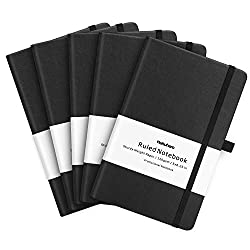
What style of journal writing is best for you? What are the benefits of journaling? For starters, the U.S. Department of Veteran Affairs reports that therapeutic journaling is as effective as other interventions (such as counseling) for trauma. In this article, we’ll walk through several types of journal writing, practical tips for how to write a journal entry, how to start a habit, and some inspiration for why it is worth the effort. As a biographer, writing coach, and journal writing devotee, I’ll share both evidence-based research and some of my own field experience.
First things first, what is journal writing?
The broadest definition of journaling is simply an informal practice of writing thoughts, feelings, and ideas. There are several types of journal writing with different purposes in mind. By the end of this article, you will be clear on your purpose and can choose the best journaling style for your needs.
Related article: Writing a personal history and why it’s important
Which type of journaling suits you?
Here are several types of journaling at a glance:
- Diary writing in the style of a regular log
- Diary writing in the style of recording important moments/thoughts
- Morning pages
- Writing a personal history
- Therapeutic journaling
Six benefits of journaling
Journaling is advocated by many therapists, physicians, writing coaches, and even the U.S. Department of Veteran Affairs. Here are a few reasons it is worth figuring out a method that works for you.
Benefit #1 – Journaling improves writing skills & creativity
Your writing will improve the more you do it. In the words of Stephen King from his wonderful book On Writing, a Memoir of the Craft, “If you want to be a writer, you must do two things above all others; read a lot and write a lot.” A habit of journaling will keep you limber so ideas can flow from your creative mind onto the page. (Disclosure if you purchase a book using a link in this article we make a small commission from Amazon. It’s a tiny portion of our income, but we always appreciate it)
Related article: My favorite books on the craft of writing
Journalling is often my first stab at a new idea, and this is where I sketch emerging thoughts. My journal entries are precursors to more formal written pieces (or even business plans) to come later. Sometimes, journaling helps me noodle on bad ideas and discard them before they chew up resources.
In short, journaling is a wonderful catalyst that will boost creativity. This habit will invite the muse and clear your mind so you’re ready to work. You might be surprised by what shows up on the page.
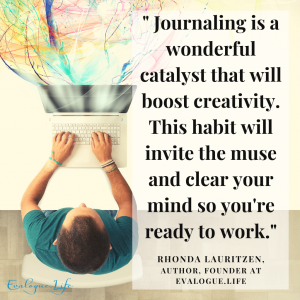
Benefit #2 – Journaling helps you figure out what you think
Countless famous authors have said variations on this quote: “I write to figure out what I think.” If you are a writer by nature, then putting words on the page is how you read the world. Journaling is a low-pressure way to process problems and creative ideas. If you hope for this benefit, I especially recommend that you check out morning pages as a style of journaling.
Benefit #3 – Journaling can quiet the swirl in your head
No good comes of letting life’s thorny issues swirl in an amorphous loop inside your own head. Get it out of there and into the light so you can deal with it. Once on the page, clarity often emerges, and fears have a way of becoming manageable. That’s how I do it anyway. Research supports this approach too, so keep reading.
Benefit #4 – Private writing might just save your relationships
There is a time to speak your piece and a time to hold your tongue. Before lashing out at someone you love, try journaling your thoughts instead. Maybe once it’s down on paper you can burn it without torching your relationship. Processing your frustrations will help you proceed more deliberately and with sensitivity. A journal can be a place to dump some icky feelings, get your heart in the right place, and work out what you want to say in a thoughtful way. Write your thoughts, then let them cool before charging into an important conversation.
Related: Watch my tutorial on sensitive subjects (YouTube)
Benefit #5 – Journaling can log your personal history
Diary writing can record details of daily happenings and thoughts, memorializing important dates and events. In addition to just the high points, you may also want to record more thoughtful impressions of those experiences.
Some diarists stick to the facts, and there is nothing wrong with that. Case in point, I do a lot of historic work from the 19th Century and journals are an absolute treasure even when they are brief. Pioneer companies in the U.S. assigned people to journal the trek west and these logs provide glimpses into daily life that reflect the experience of everyone in the wagon train. These journals were generally not works of art, but they served an important purpose and I am so grateful for them. Once in a while, however, I’ll come across a more creative writer and I savor these entries and their rich descriptions.
In your own life, this type of writing will enable you to remember details in the future. This is important because memory is notoriously unreliable, and you’ll be surprised years later to see that your journal affirms or contradicts how you have recalled events. You may even find that you recorded details that meant little at the time but that became important later. In summary, if you have any intention of writing a life story later, even a brief diary log will pay big dividends down the road.
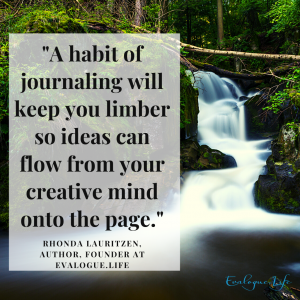
Benefit #6 – Therapeutic journaling is effective & doesn’t burn out your friends
If you are dealing with some tough stuff, then processing thorny issues through therapeutic journaling can be a wonderful alternative or addition to therapy. Doing some diligent journaling on your own can greatly speed up and improve the benefits of formal therapy. This has become an evidence-based treatment in a clinical setting.
In a similar spirit, much like there is a cost to therapy, there is also a cost to venting to your loved ones. Simply put, there’s only so much they can take. Hence, I use informal journaling to process what is bugging me and deal with it at a low level before I’m ready to discuss with anyone else. In doing so, I can sort out most of the garbage before dumping it on people whose relationship I value. I can’t afford to burn out the people who are here for me by venting too much, especially if I’m not ready to take action yet.
Related: Course on sensitive subjects and writing about the hard stuff
Therapeutic journaling can be a structured process, and the most widely used method is called the Therapeutic Writing Protocol, developed by Dr. James Pennebaker.
The U.S. Department of Veteran Affairs says: “Therapeutic journaling can be done by keeping a regular journal to write about events that bring up anger, grief, anxiety, or joy that occur in daily life. It can also be used more therapeutically to deal with specific upsetting, stressful, or traumatic life events.” This protocol works by asking someone to write about a stressful or traumatic emotional experience for 3-5 sessions over several consecutive days for 15-20 minutes per session.
How to write a journal entry using the “Therapeutic Writing Protocol”
- Write for 3-5 consecutive days for 15-20 minutes per day.
- Don’t stop until the time is up.
- Write for yourself and no one else.
- If something feels too upsetting then set that topic aside for now.
- Know that it is common for people to feel somewhat saddened or depressed, especially on the first day or two. This is normal.
- Don’t keep writing about the same topic after many days. If you are not making progress then stop and seek a health care practitioner.
- If the exercise evokes strong feelings that are beyond what you can cope with, stop immediately and reach out to a friend, do breathing exercises, go for a walk, or do some other activity to calm yourself.
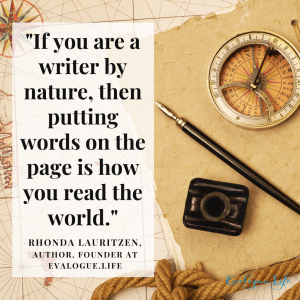
How effective is therapeutic journaling?
The VA adds: “Over the past 25 years, a growing body of research has demonstrated the beneficial effects that writing about traumatic or stressful events has on physical and emotional health.” Therapeutic journaling is associated with both short-term improvements and long-term decreases in health problems such as immune system functioning. People who are going through health problems, breakups, grief, natural disasters, and unemployment have all been shown to have “significant and substantial short-term reductions in post-traumatic stress and depressive symptoms.”
Further, therapeutic writing has been shown to be just as effective as trauma-focused cognitive behavioral therapy, which can be time-consuming and expensive. It is considered an evidence-based treatment. The VA says that “Therapeutic journaling can also be a way to reach people who are unwilling or unable to engage in psychotherapy.”
What’s the difference between a journal and a life story?
A journal, diary, or morning pages are ways of doing informal writing primarily for yourself. In contrast, a life story, autobiography, memoir, or other personal history are written to benefit the reader. A life story has been crafted with care and editing. Ideally, the important moments have been curated and then polished up so they are both engaging and inspiring.
A life story is not a dump of your entire archive; work has been done by an author so the stories will be easy to digest and meaningful. Ideally, an autobiography story will employ techniques of strong story structure so it is fun to read.
In short, journals can be helpful reference material during the research and writing phase of a full life story. They are not the ideal end product. (I can’t imagine someone having to wade through the tedium of my journals.) Caution: If you are writing a life story, be judicious in publishing excerpts from journal entries or risk boring the reader.
Related article: Writing a personal history, journal ideas, and why it’s important
Printable Storyboard Template

Storyboard any book, memoir, biography, or family history tale with our free printable template. It just might save your story.
How to write a journal entry in the style of morning pages
If your primary goal is to capture a log of important dates, events, and thoughts, you don’t need a complex system. A simple log or notes in a planner or on a calendar will do like we have discussed above. Even social media entries can serve this purpose.
If you’re looking to boost creativity and process your thoughts, however, you might benefit from the prescriptive discipline called morning pages. Many creative types (and even businesspeople) swear by this popular method pioneered by Julia Cameron in her bestselling book The Artist’s Way, first published in 1992. The basic idea is that you write exactly three full pages of longhand, stream-of-consciousness musings in an 8.5” x 11” notebook, as soon as you wake up.
Cameron recommends throwing them away, which increases authenticity and frees you from fears of judgment. What you write is totally up to you, but Cameron is very prescriptive about how. You must do it every day whether you feel like it or not and the length is important too, exactly three pages. If you’re interested in learning more about this type of journal writing, check out her book or do a simple search for morning pages. There are a lot of great articles on the subject.
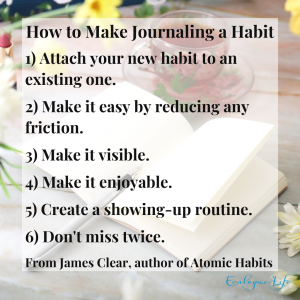
How to start a journaling habit
If you are looking to start a journaling habit, I can’t recommend the book Atomic Habits enough, by author James Clear. He teaches the most current psychology and tips for starting and sticking with any habit. Here are some quick ideas:
- Attach your new habit to an existing one. For example, “While I drink my morning cup of coffee, I will write in my journal.” Clear calls this technique “habit stacking.”
- Make it easy by reducing any friction. This means you need to find a journal writing habit that works for you, whether that’s typing, audio, or into an app that is with you all the time. The more complicated and ambitious, the more likely it will be to fail.
- Make it visible. If you want to start a habit, make sure you SEE the trigger. Set your journal next to your coffee machine, or on your desk first thing in the morning.
- Make it enjoyable. Whatever you need to do to increase the intrinsic rewards will improve your odds of sticking with a habit.
- Create a showing up routine. Create a routine whereby all you do is get started. Just journal for two minutes. If you’re doing morning pages then do it for three pages. Journal whether you feel like it or not because the trick is being consistent. Just get started.
- Don’t miss twice. If life gets in the way you can be gentle with yourself, but the rule of thumb is to never skip your habit more than once.
What format should your journal be? Longhand or typed? Fancy leather or spiral notebook?
I mentioned earlier that I’ve been a lifelong journaler and I have tried many methods. Hence, I have some thoughts on this topic. Of course, the important thing is that you figure out what works for YOU. Overall, keep your method as simple as possible.
If you are doing morning pages, it’s straightforward. See the section above. I’ve had some super fancy leather journals through the years and now eschew them because they are mostly empty. Why? It’s the perfectionism thing. If I think the book is expensive, I feel like what I write should be important and written for posterity. When I write in a book like this, my prose is stilted and pretentious. When I go back and read these entries, they seem constipated as though I was worried I might soil the pretty pages. Hence, I’ve decided that journaling is for me and anything worthy of a leather-bound book will be edited and written into more formal stories for sharing in a different format.
Here’s the happy medium I now utilize for my own journal writing: a combination of audio journals which I substitute for morning pages (because I’m a rebel like that) and journal books I purchase in bulk to keep the price at around $5 each. Here are two options, one 5-pack that I have purchased multiple times, and a 10-pack I just found to get the price down on each journal.
I label the spine of the black journals with a silver sharpie. Hence, I usually have several of these on my desk at any given time. I grab the right one whenever I’m sketching the day’s notes or ideas, depending on what I am working on, during my workweek. These are nice enough that I take at least a little care to make them legible and to organize my thoughts, but they’re basically disposable so I don’t feel like they have to be perfect. These have been worth every penny in formalizing my journal writing habit because they have made it easy, visible, and enjoyable (I like the tactile feel of the paper).
Why not type my journals? Sometimes I do type a longer journal entry when there’s something I really want to say. In theory, this might be the best way overall but in practice, I’ve gone away from typing my journals. That is because I have to sit at my desk to make a living. The computer, therefore, means work and it means being tethered to a screen. In contrast, I want my journaling habit to feel creative and enjoyable. I want it to feel like self-care and not like something I HAVE to do. As I mentioned above, I enjoy the tactile feel of these nice books, and the sound of a pen scratching on paper. I like the indulgence of sitting on the couch to sketch instead of being tied to the chair. Doing audio journals while I am driving or walking also boosts my pleasure as I journal. (See section on habits: make it enjoyable).
Related article: How to transcribe audio
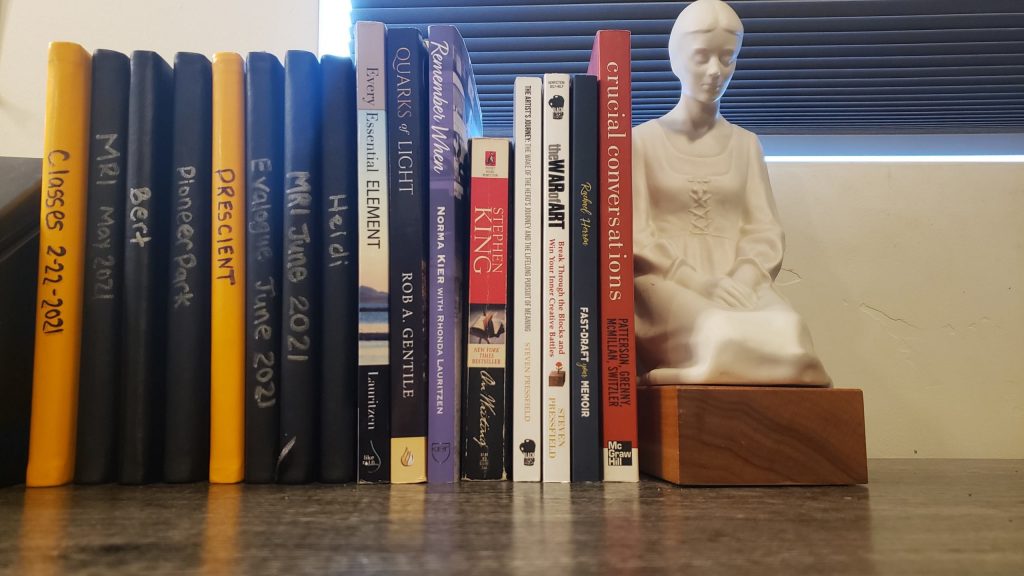
Journaling apps and audio
There are some great apps out there for journaling. I don’t personally use any journaling apps, but I have students who swear by them. Since apps change regularly, I’m not going to review them here. Just know that there are some good ones out there.
I do, however, regularly record audio journals and I use a voice recording app for this. (I currently use the Easy Voice Recorder for Android). Check out our review of voice recording apps by clicking here. I use a Sennheiser headset microphone to isolate background noise and save my voice. When I have a journal entry I want to save, I run the audio through a transcription program. My go-to for transcribing my audio is currently Happy Scribe but there are a lot of good options out there these days.
Related article: The best affordable microphones we have tried
What should you do with your journals?
Word to the wise: If you keep unfiltered journals, someone WILL eventually read them. When they do, there may be very hurt feelings and it will be too late to take it back.
I’ve also had clients inherit journals and say, “I’m not sure I should be reading these.” They wondered if they should share them, but an inner whispered that it wasn’t such a good idea. There was wisdom in that voice. Rather than inheriting a treasure, these people became the unwitting recipient of a burden, like becoming responsible for someone’s debts or baggage. Even if the content was not excessively private, sometimes the sheer volume of a journal collection can overwhelm the recipient. Don’t do this to your heirs.
In my classes, I teach that we ought to send love letters to the future, not ugliness. Yes, it is very important to be real about the hard things we faced, but we must do so after some processing and editing. In writing a life story, we want to understand a character’s back story and then show how life’s challenges helped the hero to grow. We should write with an eye toward triumph.
Related video: When not to share the hard stuff
Are you sending a time capsule or a time bomb into the future?
Rhonda Lauritzen, instructor of “Sensitive Subjects, Writing About The Hard Stuff”
If you plan to write a life story, then refer back to journals to jog your memory, but then edit the final product into something that will inspire the reader. Use excerpts from journals judiciously in a life story, otherwise, the reader will be bored. Your original journals were written for your own benefit, but your life story is for the reader.
Hence, it is important that YOU decide what you want to be done with your journals in advance. Then leave some instructions. If they are not to be shared, then make sure you destroy them yourself or install a password and leave instructions that they’re not meant for other people’s consumption. Even if you leave a note to burn them, the recipient probably won’t have the heart to do it. Think I am joking? I have personally destroyed journals. It pained me to do so, but some words don’t need to be memorialized.
Transcribing journal entries
If you need to type up your own or someone else’s journals, save yourself some serious time by transcribing them using speech-to-text technology. Simply read the entries aloud into a speech recognition program. I use this method anytime I have to manually transcribe a letter or historic document.
Here’s a super short video demonstrating how I do this: https://youtu.be/Y2x2LWIZ0Nw
Related article: How to transcribe audio
Here are some great journal prompts to get you started:
Here at Evalogue.Life we have a few popular resources for great question prompts.
- We have a comprehensive page with many question prompts here on our site. Click here.
- Download a one-page printable of some all-time favorite questions that everyone should ask:
Questions Everyone Should Ask

Don't have regrets. Preserve a life story now with our all-time best questions. Interview a loved one or prompt your own personal history. Do it now, and it will be enough.
Here is a handful of journal writing prompts specifically with journaling in mind:
- What is your biggest struggle right now?
- Gratitude writing: What are you most grateful for? Free write as much as you can think of.
- Describe a typical day in your life right now
- What music are you listening to at the moment? What songs, smells, foods, and pop culture might take you back to this phase in your life if you remember them later?
- What are your feelings about current events? Politics? Pop culture? Fashion?
- Are there children in your life right now? Describe memories you have made recently together. What is this child’s personality like at this age? What does he/she say or do? What are your feelings toward this child? Your hopes for their future?
- Describe what would be a perfect day for you.
- What did you do on your last vacation? Who was there? Describe something that went wrong that you can laugh about now. What was the high point?
- What is a big decision you face right now? Try this exercise (even if it’s just a mental exercise). Flip a coin and say you’re going with whatever the coin toss is. In the moment before you look at the answer, what do you hope the answer is? Some people say that is what you should do. Write down your feelings about this exercise. Draw a line down the middle of the page and write pros on the left, cons on the right. Which side is weighted more heavily?
Try this journal writing exercise when facing challenges
If the purpose of your journal is to process something difficult, try these prompts, thinking of your life as a movie:
- What is the hardest thing you’ve ever lived through?
- In what ways did a traumatic event make life even harder? In what ways did something hard end up shaping you for the better?
- If you could turn back the clock and make it so that event never happened, would you? Why or why not? What would you change? Were there any ways in which this event turned into something beautiful or good? (Note: It’s okay if the answer is no. There isn’t always an upside).
- If you were to write a perfect ending for your life in relation to this event, what would that look like? Use your imagination to create an ending in which a changed character emerges healed and strong. Focus on lessons learned, healing, forgiveness, and triumph.
- What loose ends still remain? What amends still need to be made?
- What did this experience teach you?
Related article: Story endings – the transformative power of storytelling

Rhonda Lauritzen is the founder and an author at Evalogue.Life – Tell Your Story. Rhonda lives to hear and write about people’s lives. She believes that when you tell your story, it changes the ending. She and her husband Milan restored an 1890 Victorian in Ogden. She especially enjoys unplugging in nature. Check out her books: How to Storyboard, and Every Essential Element. Most recently she was the writing coach of bestselling author, Rob A. Gentile, who wrote Quarks of Light, A Near-Death Experience: What I Saw That Opened My Heart

